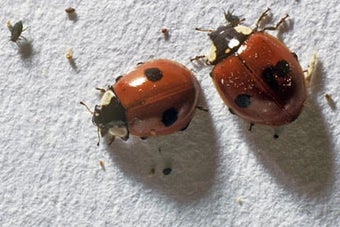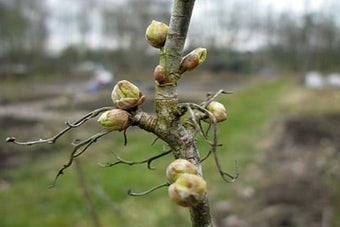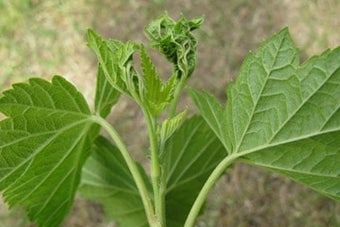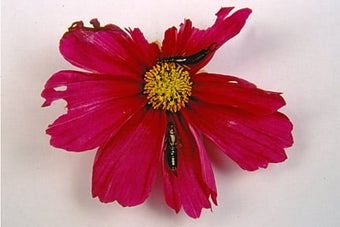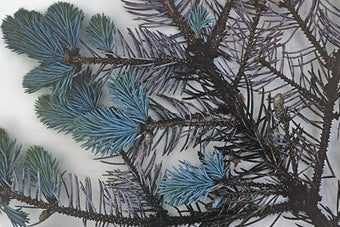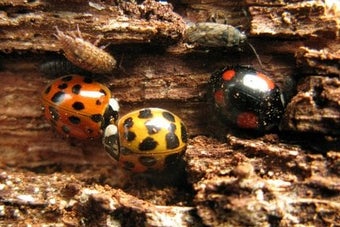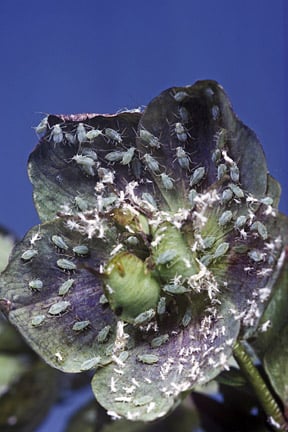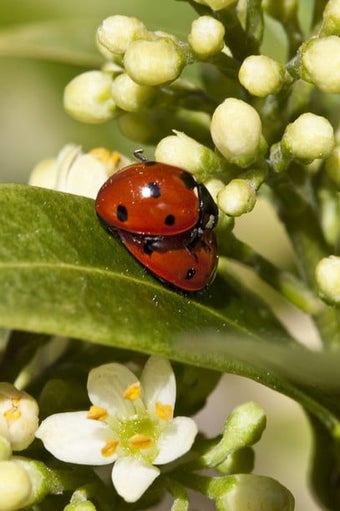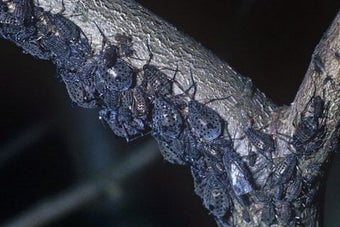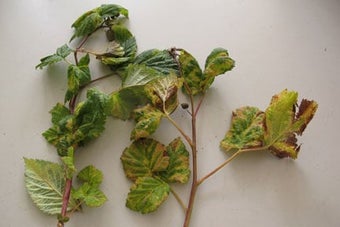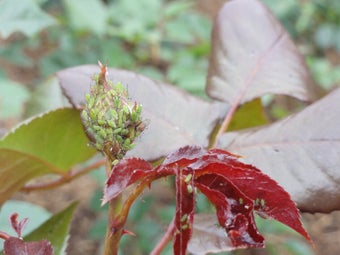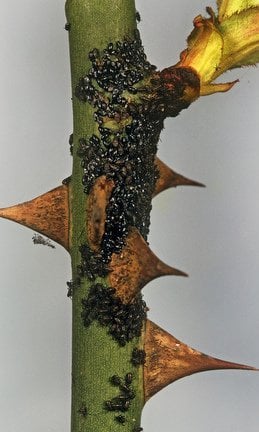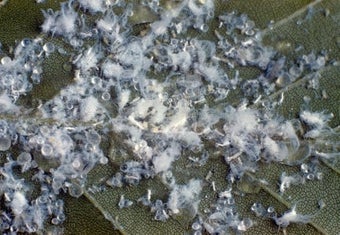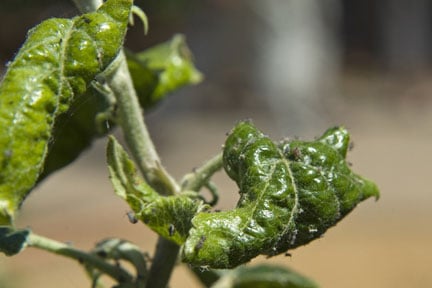
Quick facts
Common name - Fruit aphids (various species)
Plants affected - Most fruits
Main symptoms - Distorted growth, honeydew and sooty mould
Caused by - Sap sucking insects
Timing - Winter, spring and summer
What are fruit aphids?
Aphids are -sucking true bugs. They range in size from 1 to 7 mm (¼ in or less) long. Some aphids are known as greenfly or blackfly, but there are species that are yellow, pink, white or mottled. There are more than 500 aphid species in Britain. Some feed on only one or two plant species, but others can be found on a wide range of plant hosts. Many have lifecycles that involve more than one host plant. Almost any plant can be a host to aphids, including ornamentals, vegetables, fruits, greenhouse plants and houseplants. More information on aphids. Most of the fruits grown in gardens are hosts to at least one species of aphid.
Many of the aphids that feed on fruits have similar life cycles. They overwinter on the trees and bushes as eggs which are laid in crevices in the or near . Aphid eggs are usually shiny black, about 1 mm long and ovoid in shape. They hatch in spring, as the buds begin to open, and the nymphs feed on the new growth. Aphids reproduce rapidly and their numbers reach a peak on the fruit host during late spring to early summer.
Winged aphids develop and migrate away from the fruit tree or bush in early summer, sometimes leading to the population on the fruit host dying out. The aphids spend the summer on herbaceous plants. In the autumn winged aphids are again produced which fly back to the fruit tree (winter host) to mate and lay eggs. The summer host is often a wild plant and since the aphids disperse widely when they migrate, it is not possible to control them by treating or removing the summer host.
Some aphids, for example woolly aphid, and brown peach aphid, do not have a summer host and instead remain on fruit trees throughout the year.
These aphids have many natural predators and form the basis of many food chains, they can be part of a healthy garden ecosystem. These predators often wipe out aphid colonies by mid-summer.
Summer hosts and migration periods of some common fruit aphids
Apple
- Rosy apple aphid: Summer host = plantains (Plantago spp.). Leaves fruit in June-July
- Apple-grass aphid: Summer host = annual meadow grass (Poa annua). Leaves fruit in May
- Rosy leaf-curling aphid: No migration
- Woolly aphid: No migration
Cherry
- Cherry blackfly: Summer host = bedstraws (Galium spp.). Leaves fruit in June-July
Peach
- Peach-leaf rolling aphid: Summer host = clematis. Leaves fruit in May-June
- Brown peach aphid: No migration
Pear
- Pear-bedstraw aphid: Summer host = bedstraws (Galium spp.). Leaves fruit in May-June
Plum
- Plum leaf-curling aphid: Summer host = many herbaceous plants. Leaves fruit in May-early June
- Mealy plum aphid: Summer host = grasses and reeds. Leaves fruit in June-July. Can remain on plum throughout summer
Currants
- Currant blister aphid: Summer host = hedge woundwort (Stachys sylvatica). Leaves fruit in June-July
- Currant-sowthistle aphid: Summer host = sowthistle (Sonchus spp.). Leaves fruit in May-June
- Permanent currant aphid: No migration
Gooseberry
- Lettuce aphid: Summer host = lettuce. Leaves fruit in May-June
- Gooseberry aphid: Summer host = willow herbs (Epilobium spp.). Leaves fruit in May-June. Can remain on gooseberry throughout summer
Blackberry
- Large blackberry aphid: Summer host = grasses. Leaves fruit in May-June
- Scarce blackberry aphid: No migration
Raspberry
- Large European raspberry aphid: No migration
- Small European raspberry aphid: No migration
Strawberry
- Strawberry aphid: No migration

Symptoms
Fruit aphids suck from leaves, stems and sometimes the fruits of trees. Although this can affect the plants appearance, vigour and yield are in many cases not greatly reduced.
Many aphids have substances in their saliva that cause a variety of symptoms, such as stunted growth, leaf curling, distorted fruits and discolouration of the foliage.
Some virus diseases, especially of soft fruits (e.g. raspberry viruses and strawberry viruses), can be transmitted by aphids as they move from one plant to another. Infected plants may show stunted growth, leaf mottling or other symptoms.
Aphids excrete a sugary substance, known as honeydew that makes the foliage and fruits sticky and can attract ants. A black sooty mould often grows on the honeydew, which reduces the amount of sunlight reaching the leaves and can spoil the appearance of the fruit.
Management
Fruit aphid populations are often not noticed until the plants are showing obvious signs of damage in the spring and early summer. In some cases by this time the damage is done and the aphids may have already left for their summer hosts or been consumed by predators making control measures redundant and undesirable.
Aphids form the basis of many food chains in the garden and it is not unusual to have some of these animals in a healthy balanced garden ecosystem. On established trees and shrubs aphids can usually be considered part of the they support, natural enemies will normally reduce numbers during summer.
- Where possible tolerate populations of aphids
- Encourage aphid predators in the garden, such as ladybirds, ground beetles, hoverflies, parasitoid wasps and earwigs. Be aware that in spring aphid populations often build up before natural enemies are active in sufficient numbers and then give good control
- Check fruit plants frequently from spring onwards so action can be taken before a damaging population has developed
- Use finger and thumb to squash aphid colonies where practical










